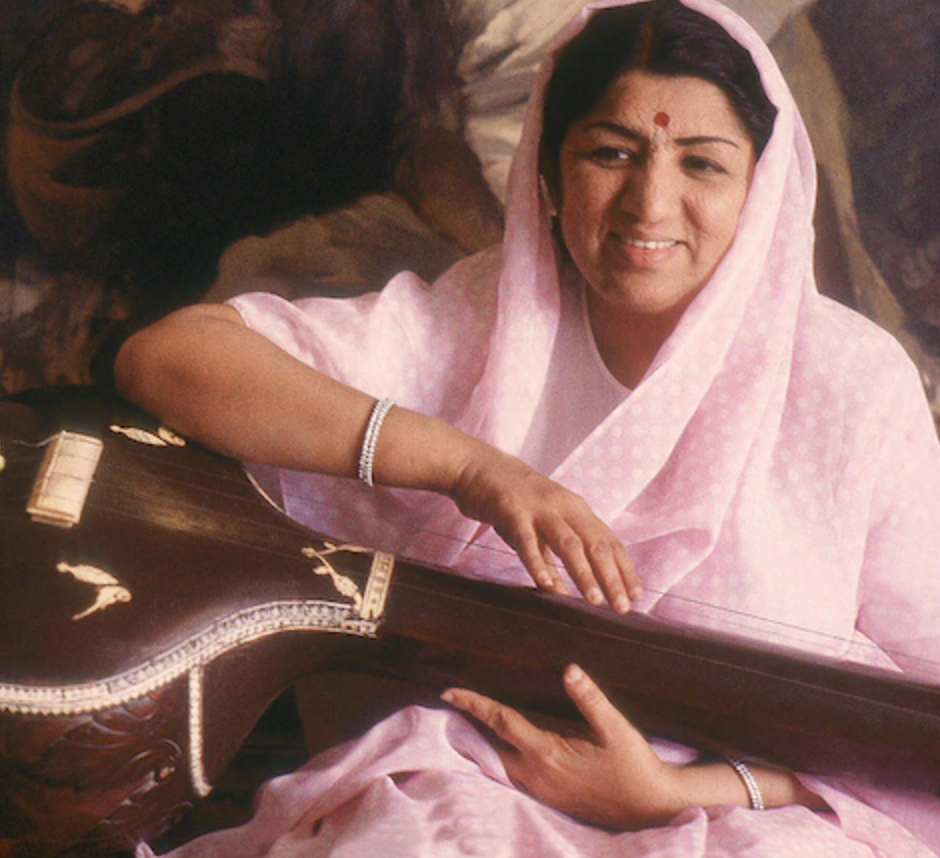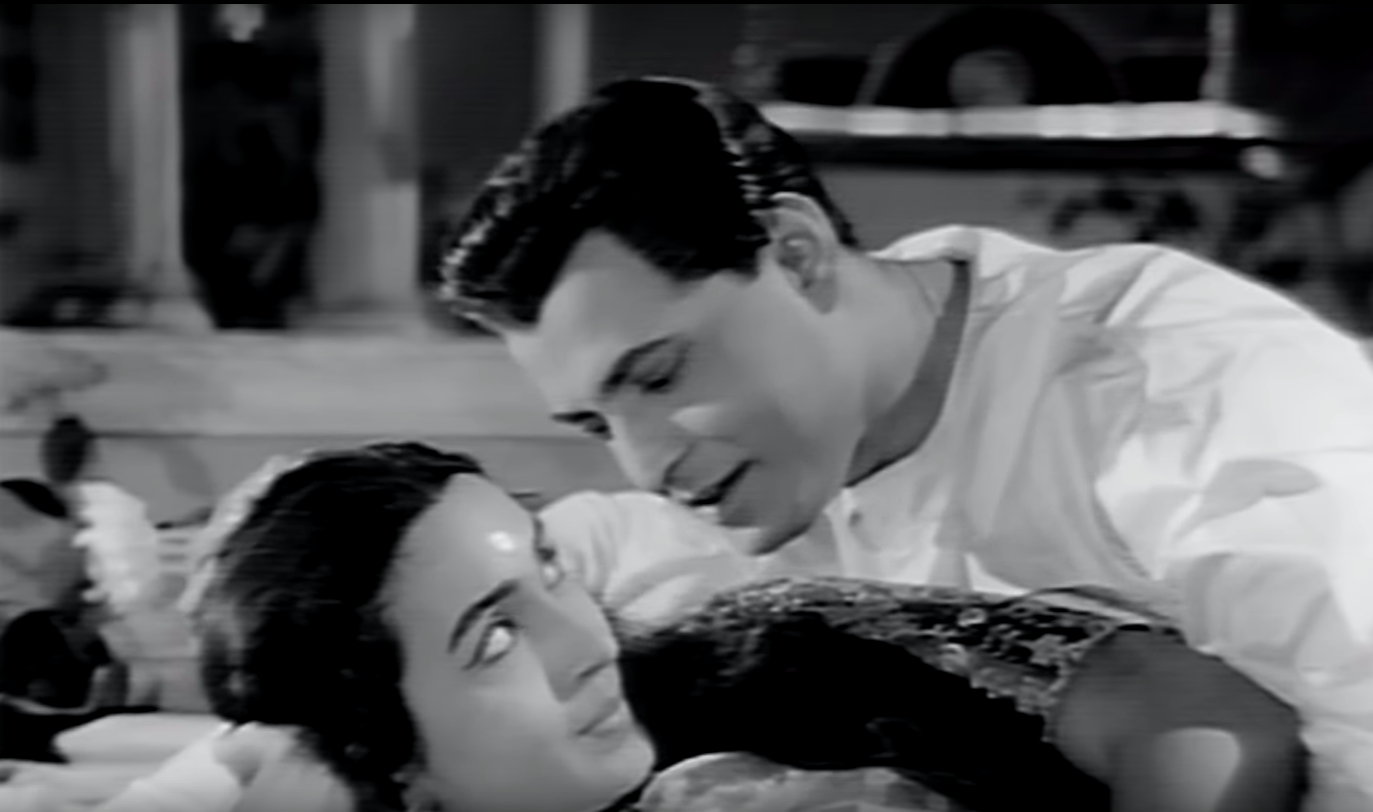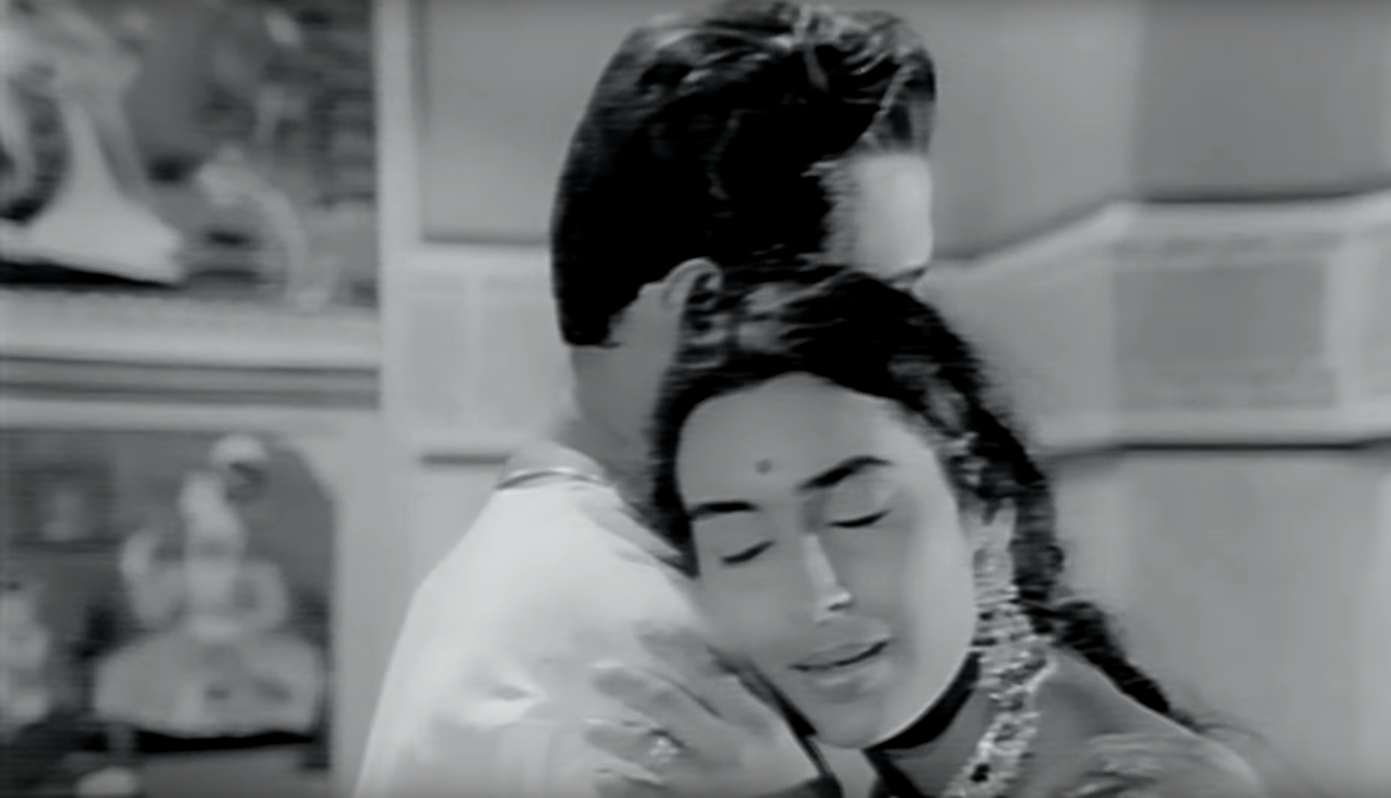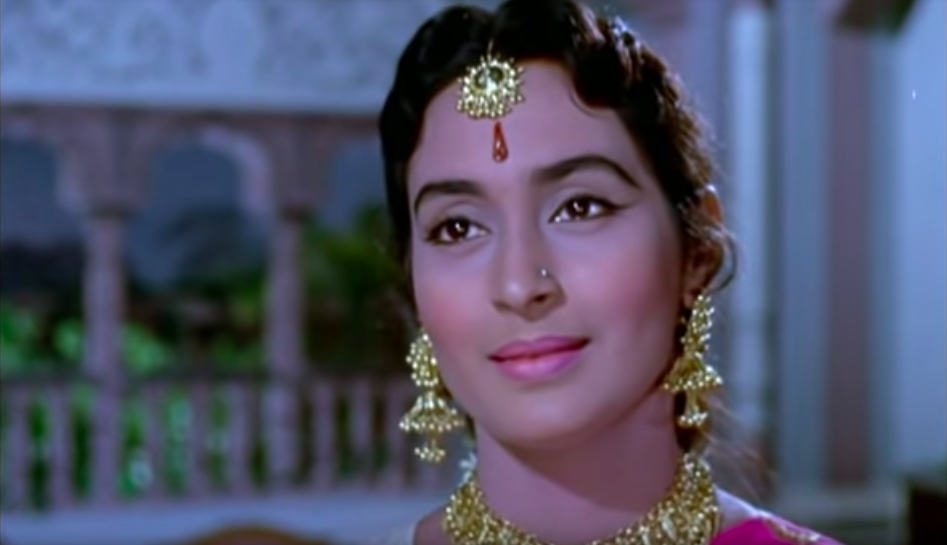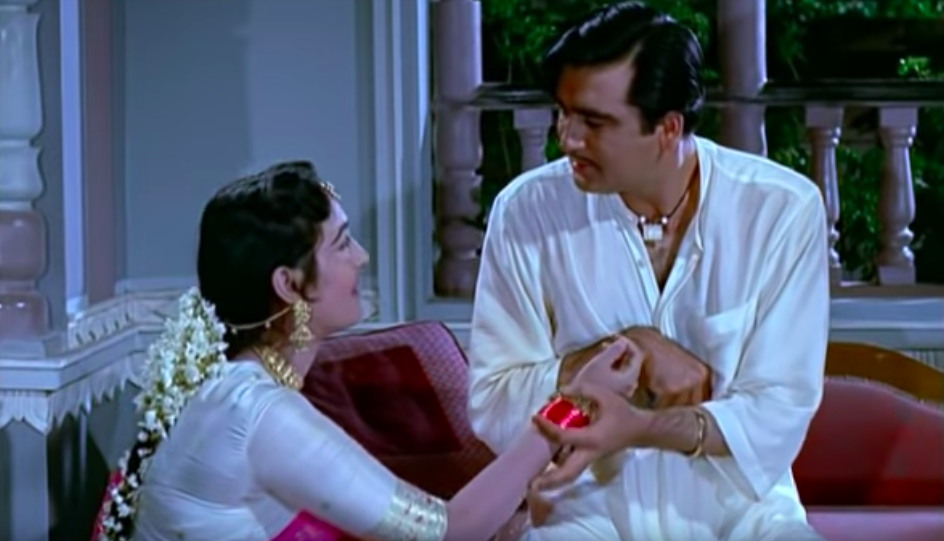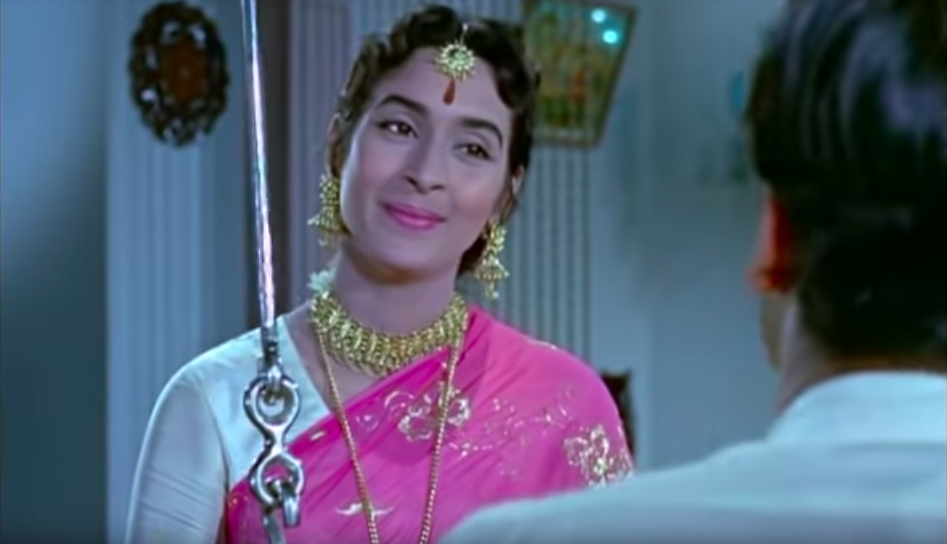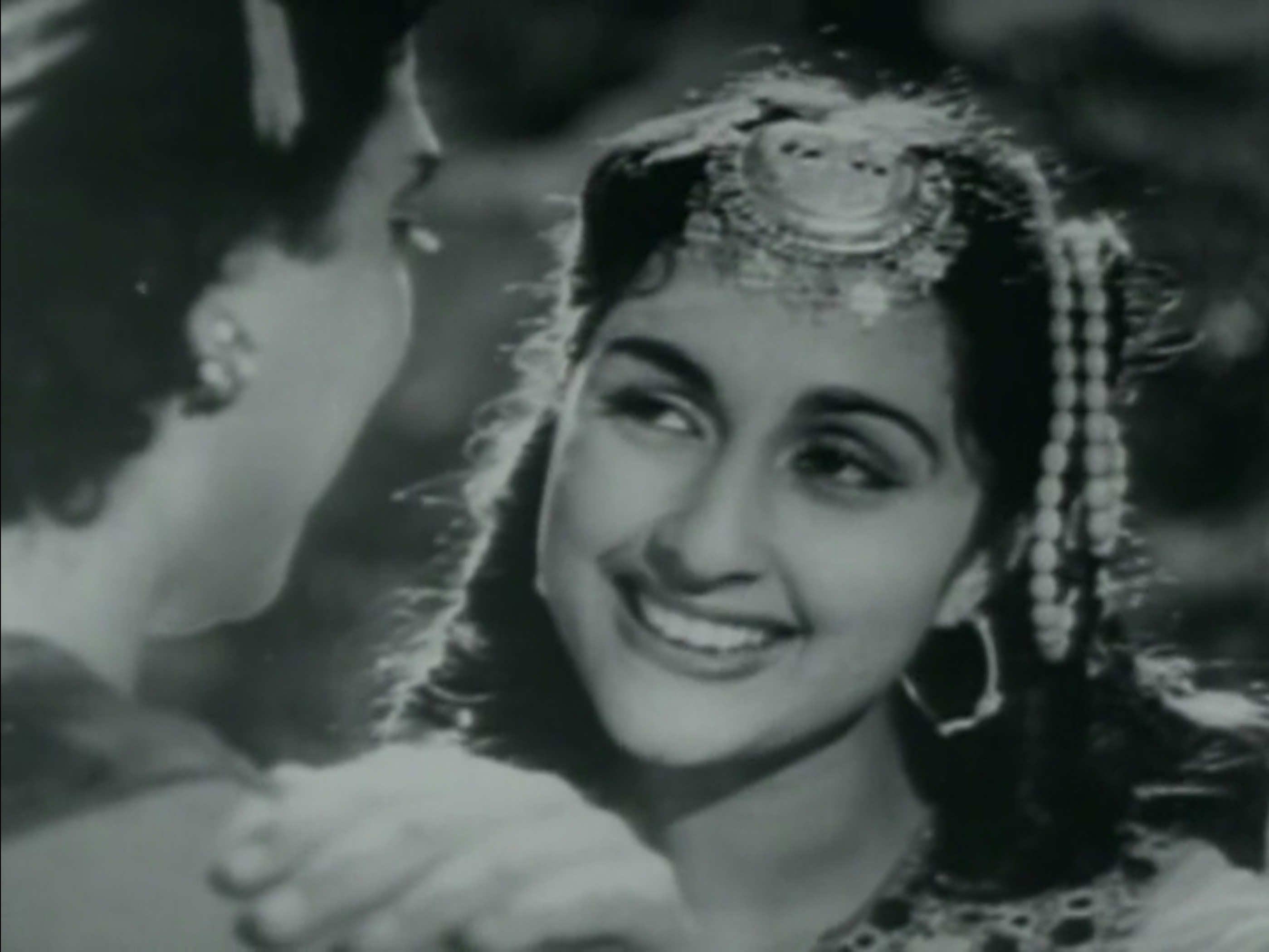
Bina Rai’s enchanting smile commands the screen in Anarkali (1953).
Today we present the lyrics and English translation to “Yeh Zindagi Usiki Hai” from Anarkali (1953). “Yeh Zindagi Usiki Hai” is a true Bollywood legend, one of Lata Mangeshkar’s most iconic numbers picturised upon a nail-biting thriller of historical mythology.
The doomed tale of 16th century Mughal Prince Salim and fabled courtesan Anarkali has been a favorite of the Bollywood film industry dating back to the pre-talkie days. A silent film in 1928 and then a talkie in 1935 starred Sulochana in the title role (who incidentally also plays Queen Jodha in the 1953 version).
In 1944, K. Asif too announced he would remake the film with Nargis as the lead, but unfortunately, the film was put on hold with the partition of India when his producer Shiraz Ali Hakim moved to Pakistan. Almost a decade after Bina Rai’s 1953 version became a blockbuster, K. Asif picked up steam on his “period” project, toyed with casting Nutan before honing in on Madhubala, and eventually released his magnum opus Mughal-e-Azam (1961).
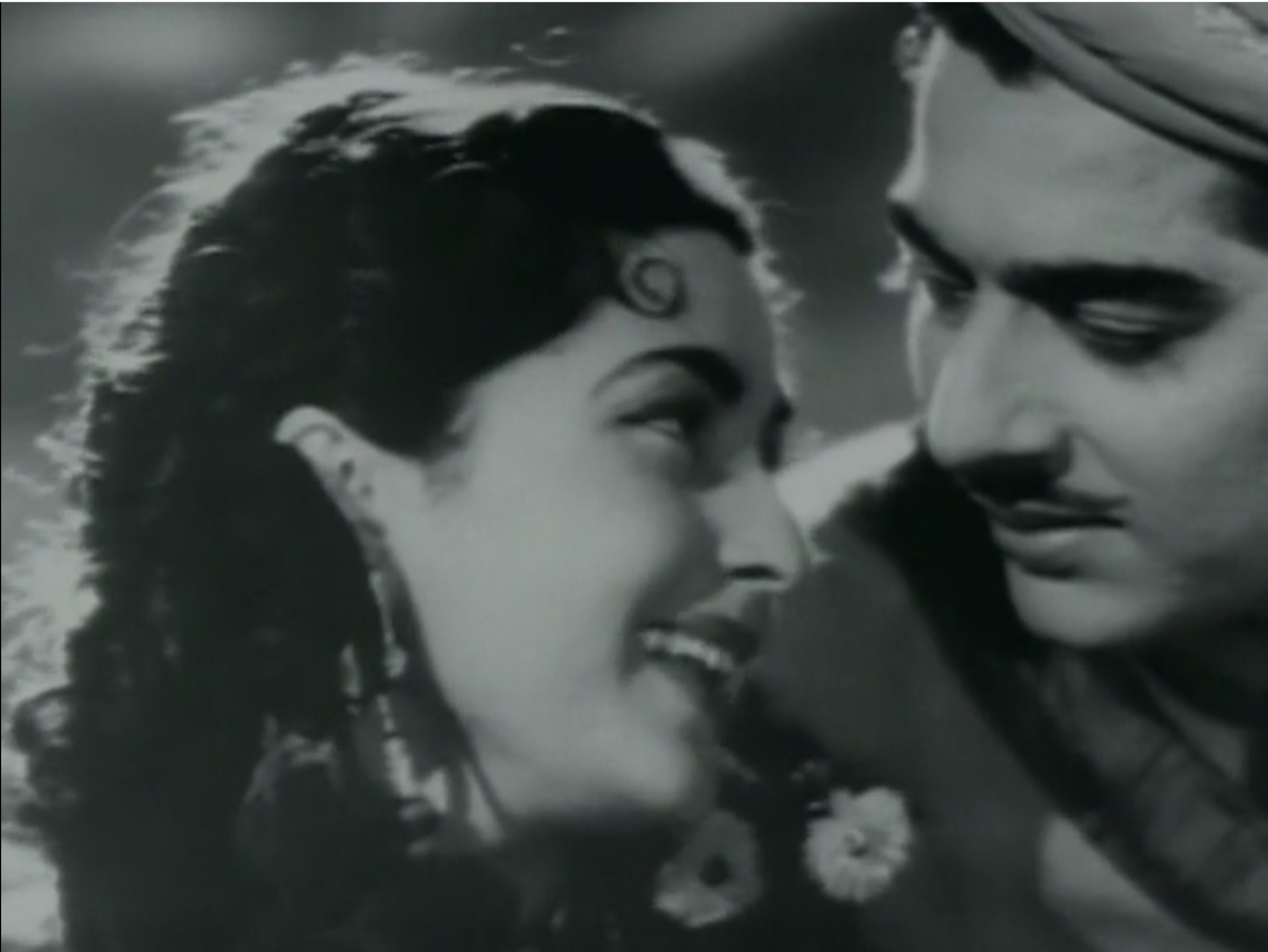
Pradeep Kumar and Bina Rai star as Prince Salim and his songstress lover in Anarkali (1953).
In Filmistan’s magnificent 1953 version, the song “Yeh Zindagi Usiki Hai” both opens and ends the film. A romantic version starts the movie on a high note (literally) while an ominous version carries the film’s climax as the heroine is entombed alive. The cinematography, particularly of the first iteration, is stunning: dream-like extreme close-ups of Bina Rai lend a lyrical quality to the Salim-Anarkali courtship. Every shot is infused with languid glamour matched by the actress’ complete command of the screen. I remain awestruck by Bina Rai’s performance–she possess that elusive je ne sais quoi, which eclipses beauty or theatrics to make her unquestionably a star. You cannot stop watching her even as the last brick is placed in front of her face (Geeta Bali from that era possesses a similar enchanting appeal).
Let me be clear: no matter how you slice it, the biggest star of this piece is Lata Mangeshkar whose vocals could overpower any Mughal army–from her gorgeous opening alaap to the haunting final farewell. It’s one of those mind-numbing songs that makes me sad when I remember some people live their whole pathetic lives without ever hearing this angel’s voice. Music composer C. Ramachandra famously shafted Geeta Dutt by switching the soundtrack to a pure Lata production halfway through (fortunately, one Geeta Dutt number was salvaged). The expert sitar that punctuates both versions of “Yeh Zindagi Usiki Hai” is performed by none other than Abdul Halim Jaffer Khan (yes, the same genius who wowed you in “Madhuban Mein Radhika“).
Now that your cup runneth over with tea, check out the lyrics and our English translation to “Yeh Zindagi Usiki Hai” below!
Yeh Zindagi Usiki Hai Lyrics & English Translation:
Romantic version:
Yeh zindagii usii kii hai jo kisii ka ho gayaa
This life belongs to only to whomever gives themselves to another
pyaar hii mei.N kho gayaa
To whomever becomes lost in love
Yeh bahaar yeh samaah keh rahaa hai pyaar kar
This spring and this moment are telling us to fall in love
Kisi kii aarzuu mei.N apne dil ko beqaraar kar
They tell us to make ours hearts restless in desire of another
Zindagii hai bewafaa…
Life is unfaithful
Zindagii hai bewafaa, luuT pyaar kaa mazaa
Life is unfaithful, so we must steal the pleasures of love
Yeh zindagii usii kii hai…
dhaDak rahaa hai dil, to kyaa? Dil ke dhaDakane.N na gin
So what if my heart is racing? Do not count your heartbeats
Phir kahaa.N yeh fursate.N, phir kahaa.N yeh raat-din
Where again will we have this leisure time, where again will we have these days and nights?
Aa rahii hai yeh sadaa…
The call is coming
Aa rahii hai yeh sadaa mastiiyo.N mei.N Duub jaa
The call is coming for us to immerse ourselves in these intoxications
Yeh zindagii usii kii hai..
Yeh zindagii usii kii hai jo kisii ka ho gayaa
This life belongs to only to whomever gives themselves to another
pyaar hii mei.N kho gayaa
To whomever becomes lost in love

Bina Rai as Anarkali gazes at the audience one final time before she is (in theory) entombed alive in Anarkali (1953).
Sad version:
Yeh zindagii usii kii hai jo kisii ka ho gayaa
This life belongs to only to whomever gives themselves to another
pyaar hii mei.N kho gayaa
To whomever becomes lost in love
Jo dil yahaa.N na mil sake, mile.Nge us jahaa.N mei.N
Those hearts which could not meet here will meet in the other world
Khile.Nge hasrato.n ke phuul, jaa ke aasmaan mei.N
The flowers of our wishes will bloom as they reach heaven
Yeh zindagii chalii gayii…
Even if this life goes away
Yeh zindagii chalii gayii jo pyaar mei.N, to kyaa huaa?
Even if this life goes away, if it was for love, then so what?
Yeh zindagii usii kii hai…
Sunaayegii yeh daastaa.N, shamaa mere mazaar kii
The flame of my shrine will tell this story
Khizaa.N mei.N bhii khilii rahii, yeh kalii anaar kii
This pomegranate flower will keep blooming even in Autumn
Isse mazaar mat kaho…
Do not call this a shrine
Isse mazaar mat kaho, yeh mahal hai pyaar kaa
Do not call this a shrine, this is a palace of love
Yeh zindagii usii kii hai…
This life…
Hai zindagii kii shaam aa, tujhe gale lagaauu.N mai.N
Let the evening of my life come, I would take you in my arms
Tujhii mei.N Duub jaauu.N mai.N
I would immerse myself in you
Jahaa.N ko bhuul jaauu.N mai.N
I would forget the world
Bas ek nazar, mere sanam…
Just one last glance from you, my dear
Alviidaah….alviidaah…
Farewell…farewell…
Alviidaah….alviidaah…
Farewell…farewell…
Alviidaah….alviidaah…
Farewell…farewell…
Alviidaah….alviidaah…
Farewell…farewell…
Glossary:
zindagii: life; pyaar: love: kho jaanaa: to become lost; bahaar: Spring; samaa: moment, time; aarzuu: desire; beqaraar: restless; bewafaa: unfaithful; luuTnaa: to steal; mazaa: enjoyment, pleasure; dhaDaknaa: to beat [heart]; dil: heart; ginnaa: to count; fursaat: leisure time; raat-din: night and days; sadaa: call, cry; mastii: intoxication; Duubnaa: to drown, to immerse; hasrat: wish, desire; phuul: flower; aasmaa.N: sky, heaven; sunaanaa: to tell, to make heard; daastaa.N: story; shamaa: light, flame; mazaar: shrine, tomb; khizaa: Autumn; khilnaa: to bloom; kalii: flower; anaar: pomegranate; mahal: palace; shaam: evening; gale lagaanaa: to take in [one’s] arms; bhuulnaa: to forget; nazar: glance; sanam: lover, dear; alviidaah: farewell

Sulochana (also known as Ruby Myers) was a silent Indian film star of Jewish ancestry who starred in Anarkali (1928) (left) and later played Queen Jodha in the 1953 remake (right).
You are doubtless asking yourself, why did they have to entomb Anarkali alive though? Was there no more humane way of doing things? Okay, fine, the Mughals were not exactly known for their humane war strategies, but sheesh, when Prince Salim arrives at her tomb, don’t you think he would try tearing it down and checking if she’s alive rather than just having a meltdown and crying? Seriously, there had to be enough oxygen in there to last at least a little while longer!
As it turns out, Indian audiences couldn’t get enough of Pradeep Kumar and Bina Rai in a good old Mughal romance so they were cast again ten years later as Shah Jahan (Prince Salim’s real life son) and his queen Mumtaz Mahal in the film Taj Mahal (1963). Check out “Jo Wada Kiya Woh” or “Paao.N choo lene do” for more epic period Urdu poetry!
– Mrs. 55
